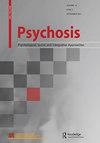What do trainee cognitive behavioural therapists need from clinical supervision to develop their skills in working with people with psychosis? A qualitative analysis
IF 1
4区 医学
Q4 PSYCHIATRY
Psychosis-Psychological Social and Integrative Approaches
Pub Date : 2021-07-01
DOI:10.1080/17522439.2021.1924243
引用次数: 1
Abstract
ABSTRACT Background Clinical supervision is assumed to be essential to the development of competent psychological therapists. While the evidence for effective psychological therapy training remains sparse, there is some support for the role of supervision and the experiential learning cycle in trainees’ progression. Despite a growing demand for cognitive behavioural therapy for psychosis (CBTp), no research has investigated the components of CBTp supervision necessary for skilful therapeutic practice. Methods We completed a qualitative thematic analysis of 385 supervision questions from 11 trainee CBTp therapists. Results The analysis yielded three main themes – knowledge/content (What?) questions; procedure/process (How?) questions; and course requirements/assessment methods (Training) questions. What? questions decreased over the 20 weeks of supervision, How? questions were raised throughout, and Training questions increased prior to academic deadlines. The thematic analysis also showed that active experimentation (the final stage of the experiential learning cycle) may be omitted from supervisory practice. Discussion These results indicate that CBTp supervision should prioritise knowledge, procedural learning and active experimentation, in training therapists to deliver high quality CBT for people with psychosis.实习认知行为治疗师需要从临床监督中得到什么,以发展他们与精神病患者合作的技能?定性分析
背景临床监督被认为是培养合格心理治疗师的必要条件。虽然有效的心理治疗培训的证据仍然稀少,但有一些证据支持监督和体验式学习周期在受训者的进步中的作用。尽管对精神病认知行为疗法(CBTp)的需求不断增长,但没有研究调查了熟练治疗实践所需的CBTp监督组成部分。方法对11名CBTp培训治疗师的385个监督问题进行定性主题分析。结果分析得出三个主要主题-知识/内容(什么?)问题;程序/过程(如何?)问题;课程要求/考核方法(培训)问题。怎么啦?在20周的监督中,问题减少了,如何?问题贯穿始终,培训问题在学术截止日期前增加。专题分析还表明,主动实验(体验式学习周期的最后阶段)可能被省略。这些结果表明,在培训治疗师为精神病患者提供高质量CBT的过程中,CBTp监督应优先考虑知识、程序学习和主动实验。
本文章由计算机程序翻译,如有差异,请以英文原文为准。
求助全文
约1分钟内获得全文
求助全文
来源期刊
CiteScore
2.20
自引率
8.30%
发文量
36

 求助内容:
求助内容: 应助结果提醒方式:
应助结果提醒方式:


